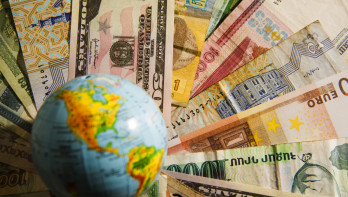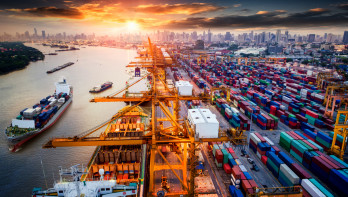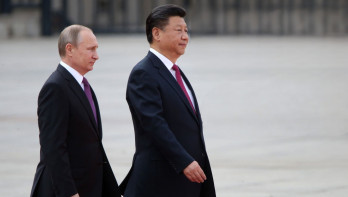Opinion Han de Jong
Growth of world economy disappoints
I am back and the world economy does not look any better than a month ago. Confidence indicators in Europe fell in June. In our own country, the NEVI purchasing managers' index unexpectedly dropped in June: 50.7 compared to 52.5 in May. This index was just on a nice upward trend, but had already anticipated the confidence index of the CBS. The confidence indices in the industry in Europe also declined in June, just like those of the NEVI.
Of course, there are always bright spots. For example, the recovery in Southern Europe is stronger than in our region. In May, Spain, for example, received 11.5% more foreign tourists than a year earlier. In the first five months of the year, the total is 13.6%. In absolute numbers, it is a record. Foreign tourists contribute about 12% to the GDP. So, this increase in tourism already accounts for over 1.5% GDP growth.

The industry in Europe remains a weak point. In our own country, for example, production in the manufacturing industry in May was over 3% lower than a year ago. In our neighboring country, the level of industrial production in May was even 6.7% lower than in May of the previous year. The following picture shows that the increase in automobile production is completely stalling in Germany.

As ECB President Christine Lagarde pointed out during her last press conference, the credit demand from companies continues to decline. This is evident from the Bank Lending Survey, a survey conducted quarterly by the ECB among commercial banks. A reading below zero in the following chart means that there are more banks reporting a decrease in credit demand than banks reporting an increase. However, the rate of decline has been decreasing for several quarters.

China not doing well either
The Chinese economy has been disappointing for a year and a half, and the recent figures do not justify optimism. China's GDP grew by only 0.7% in the second quarter compared to the first quarter. This is low for China. The year-on-year growth fell from 5.3% in the first quarter to 4.7%. This is below the policymakers' target. In June, the year-on-year growth of retail sales and industrial production also declined. It's a familiar story. The proven growth engines of the Chinese economy, the real estate sector and exports, are struggling. The real estate sector is burdened with high debts, and exports are under pressure due to weak global trade. Increasing protectionism is also not favorable for China.
US showing some improvement
Things look somewhat better in the US. The industry there is still showing some growth. In May and June combined, the production in the American industry increased by about 1.5%, and year-on-year it stands at +1.6%. It's not spectacular, but much better than in Europe. Retail sales also continue to increase at a satisfactory pace.
Confidence indicators also point to a weakening of the economy there. For example, the confidence index of home builders in July fell for the third consecutive month and is now at the lowest level of this year.
What is also striking is how weak consumer confidence is. The University of Michigan's gauge of consumer sentiment declined in July for the fourth consecutive month. The following chart shows that consumer confidence is remarkably low compared to the still rising, but still low, unemployment rate.

An explanation for the low consumer confidence may be inflation. Surveys indicate that the high inflation of recent years has caused a lot of dissatisfaction. This has not improved much now that inflation has decreased. It's no wonder that inflation plays a major role in the election campaign.
Trump promises to end inflation quickly. 'Make America affordable again' is one of his slogans. Of course, he blames Biden for the high inflation. That may be a bit exaggerated, although Biden's very loose fiscal policy has certainly contributed to high inflation.
Trump promises to boost oil and gas production, which may lower energy prices. He also promises tax cuts. The corporate tax rate is set to decrease from 21% to 15%, and employees are promised massive tax cuts. Who wouldn't want that? He also promises to increase import tariffs, tighten immigration, and deport a large number of illegal immigrants. Deregulation is also part of his plans.
Overall, Trump's plans may be comparable to those of Reagan and align with what supporters of the 'supply-side economics school' advocate. Critical economists point out that Trump's plans will fuel inflation. Tax cuts lead to increased demand. Additional import tariffs, according to theory, lead to higher prices in the domestic market, and reducing immigration reduces labor supply and therefore production capacity.
I wonder if these economists are being too influenced by their dislike of Trump. The economy did well under Reagan. And during Trump's presidency, import tariffs did not lead to much inflation because the companies exporting to the US largely absorbed the import tariffs by limiting their profit margins. There are disagreements about the impact of immigration on inflation. Of course, immigration increases production capacity, but those people also spend their incomes. In fact, it seems that immigration initially contributes to high inflation because migrants need somewhere to live, driving up rents for housing. In the past year and a half in the US, it has been the rent increases that have contributed significantly to inflation, and those rent increases have also proven to be remarkably persistent.
Inflation under Trump may not turn out to be as bad as feared. Perhaps he will also be lucky that inflation will fall anyway. Trump will undoubtedly claim credit for that. That's just how he is, and he's not the only politician who will claim such success. It remains to be seen if Trump can win the elections if the Democrats nominate a different candidate. Rumor has it that this could happen this weekend.
ECB keeps interest rates unchanged, but further cuts are coming
As expected, the ECB's official interest rate remained unchanged this week. I believe that the ECB will decide on a second cut in September. During her press conference, Lagarde confirmed that the current level of interest rates is still restrictive. She did not try to downplay the fact that the current economic recovery is at risk of stalling. She did admit that inflation is still too high and acknowledged that wage growth is still higher than what is compatible with 2% inflation. However, she made every effort to qualify that wage growth extensively. She explained in detail that the wage formation process in Europe naturally leads to wage growth lagging behind in case of an unexpected rise in inflation. The current wage increases are still a compensation for previous purchasing power losses. Furthermore, she emphasized that the current high wage growth is at least partially absorbed by decreasing profit margins. And finally, she repeated several times that surveys suggest that wage growth will fall significantly next year.
Considering that the ECB trusts that inflation will improve next year, the current economic growth is at risk of stalling, and the current interest rate level is restrictive, it is reasonable to assume that further interest rate cuts are on the way. Since the interest rate is significantly higher than what can be considered a neutral level, it doesn't make much sense for the ECB to wait long. Therefore, I believe that the policy meeting in mid-September is a likely moment for another interest rate cut.
Conclusion
Contrary to my earlier expectations, the global economy seems to be weakening. Confidence indicators in Europe show a deterioration in June, while the 'hard' data on production, exports, etc. in the preceding months generally disappointed. Especially the industry shows no signs of recovery.
In the US, the industry is clearly doing better than in Europe. And the consumer also seems willing to increase spending. However, the American economy also shows weak spots. Various confidence indicators are declining, and consumer confidence is remarkably low despite reasonable spending. The housing market is also under pressure.
The Chinese economy is also facing challenges. The headwinds are so strong that it requires significant policy stimuli to boost the economy. However, policymakers seem unwilling or unable to do so.
Many economists are highly critical of Donald Trump's economic plans. I believe that this criticism is only partly justified. It remains to be seen how much of his plans he will be able to implement if elected president. That is uncertain, of course. If the Democrats nominate a candidate other than Biden, things will become even more exciting, uncertain, and interesting.
The ECB kept interest rates unchanged this week, but further interest rate cuts are on the horizon. I believe a second interest rate cut, following the one in June, will come in September.

Han de Jong
© DCA Market Intelligence. Op deze marktinformatie berust auteursrecht. Het is niet toegestaan de inhoud te vermenigvuldigen, distribueren, verspreiden of tegen vergoeding beschikbaar te stellen aan derden, in welke vorm dan ook, zonder de uitdrukkelijke, schriftelijke, toestemming van DCA Market Intelligence.



